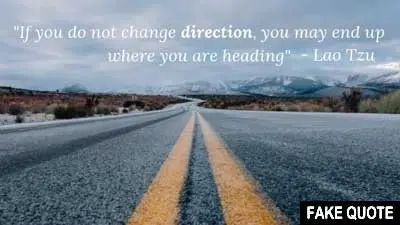Fake Lao Tzu Quote
"If you do not change direction..."

This is NOT a quote from Tao Te Ching:
"If you do not change direction, you may end up where you are heading."
The Book
The Taoism of Lao Tzu Explained. The great Taoist philosophy classic by Lao Tzu translated, and each of the 81 chapters extensively commented. Click the image to see the book at Amazon (paid link).
More about the book here.
|
Accrediting this quote to Lao Tzu is insulting to his intellect. It is pure nonsense in a presumptuous form. If you don't change direction, where else would you end up but where you are heading?
Actually, the quote makes a mistake in tenses. Even if you change direction, you end up where you are heading, but not where you were heading before changing direction.
So, double nonsense.
|
90 of the most spread false Lao Tzu quotes, why they are false and where they are really from. Book by Stefan Stenudd. Click the image to see the book at Amazon (paid link).
More about the book here.
|
Lao Tzu was not much for travel. His main objection to it was that you find no higher truth elsewhere than right where you are. If it's not there, it is nowhere. In chapter 47 he stated (my version):
Without stepping out the door,
You can know the world.
Without looking through the window,
You can see Heaven's Way.
The longer you travel, the less you know.
And in chapter 80, where he described his ideal society, people should not be inclined to travel:
Although they have boats and carriages,
There's no occasion to use them.
So, for Lao Tzu it was not about taking a trip where you allow yourself to end up just about anywhere. It was about being at peace where you are and remaining there.
The oldest book I have found with this exact quote is The Dragon Doesn't Live Here Anymore: Loving Fully, Living Freely, by Alan Cohen, from 1981 (page 355). Already there, Lao Tzu is accredited with it — without any source, to no surprise. Cohen is a successful writer of so-called inspirational books.
Among his many books is one called The Tao Made Easy from 2018. There, the excerpts from Tao Te Ching he used are from the Gia-fu Feng and Jane English version in the 2011 edition. The quote discussed here, though, is not to be found in their book.
The same quote, just replacing "may" with "will," is found in several books, most of them calling it a Chinese proverb. None of them is older than that of Cohen. So, they may have gotten it from his book, and paraphrased it.
Stefan Stenudd
September 16, 2020.
There are many more fake Lao Tzu quotes examined on this website.
Click the header to see a list of them.
Click the header to read a "fake" interview with Stefan Stenudd, the author of
Fake Lao Tzu Quotes.
My Taoism Books
Click the image to see the book at Amazon (paid link).
The Taoism of Lao Tzu Explained. The great Taoist philosophy classic by Lao Tzu translated, and each of the 81 chapters extensively commented.
More about the book here.
The Ancient Wisdom of the Tao Te Ching by Lao Tzu. 389 quotes from the foremost Taoist classic, divided into 51 prominent topics. Click the image to see the book at Amazon (paid link).
More about the book here.
Erroneous Tao Te Ching Citations Examined. 90 of the most spread false Lao Tzu quotes, why they are false and where they are really from. Click the image to see the book at Amazon (paid link).
More about the book here.
|
My Other Websites:
The 64 hexagrams of the Chinese classic
I Ching and what they mean in divination. Try it online for free.
The ancient Chinese life energy
qi (
chi) explained, with simple instructions on how to exercise it.
The many ancient and modern life force beliefs all over the world explained and compared.
Other Books by Stefan Stenudd
Click the image to see the book at Amazon (paid link).
The Greek philosophers and what they thought about cosmology, myth, and the gods.
The life energy
qi (also
chi or
ki) explained, with exercises on how to awaken, increase and use it.
Basic concepts of the peaceful martial art. Aikido principles, philosophy, and fundamental ideas.
Qi, prana, spirit, ruach, pneuma, and many other life forces around the world explained and compared.
Jungian theories on myth and religion examined, from Carl G. Jung to Jordan B. Peterson.
About me
I'm a Swedish author and aikido instructor. In addition to fiction, I've written books about Taoism and other East Asian traditions. I'm also an historian of ideas, researching ancient thought and mythology. Click the image to get to my personal website.

 Tao Te Ching
Tao Te Ching Now it's a book, too!
Now it's a book, too! Tao Quotes
Tao Quotes Cosmos of the Ancients
Cosmos of the Ancients Qi — Increase Your Life Energy
Qi — Increase Your Life Energy Aikido Principles
Aikido Principles Life Energy Encyclopedia
Life Energy Encyclopedia Archetypes of Mythology
Archetypes of Mythology Stefan Stenudd
Stefan Stenudd